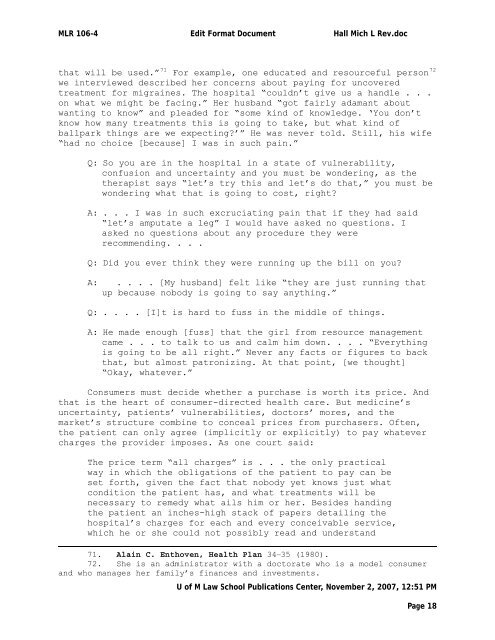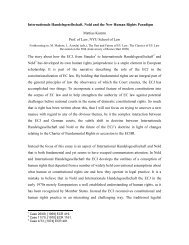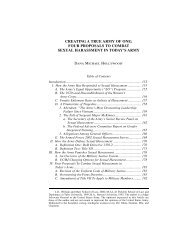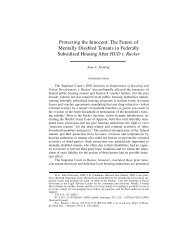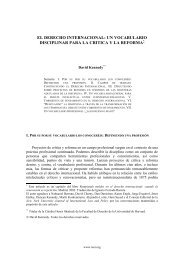Patients as Consumers - Harvard Law School
Patients as Consumers - Harvard Law School
Patients as Consumers - Harvard Law School
Create successful ePaper yourself
Turn your PDF publications into a flip-book with our unique Google optimized e-Paper software.
MLR 106-4 Edit Format Document Hall Mich L Rev.doc<br />
that will be used.” 71 For example, one educated and resourceful person 72<br />
we interviewed described her concerns about paying for uncovered<br />
treatment for migraines. The hospital “couldn’t give us a handle . . .<br />
on what we might be facing.” Her husband “got fairly adamant about<br />
wanting to know” and pleaded for “some kind of knowledge. ‘You don’t<br />
know how many treatments this is going to take, but what kind of<br />
ballpark things are we expecting?’” He w<strong>as</strong> never told. Still, his wife<br />
“had no choice [because] I w<strong>as</strong> in such pain.”<br />
Q: So you are in the hospital in a state of vulnerability,<br />
confusion and uncertainty and you must be wondering, <strong>as</strong> the<br />
therapist says “let’s try this and let’s do that,” you must be<br />
wondering what that is going to cost, right?<br />
A: . . . I w<strong>as</strong> in such excruciating pain that if they had said<br />
“let’s amputate a leg” I would have <strong>as</strong>ked no questions. I<br />
<strong>as</strong>ked no questions about any procedure they were<br />
recommending. . . .<br />
Q: Did you ever think they were running up the bill on you?<br />
A: . . . . [My husband] felt like “they are just running that<br />
up because nobody is going to say anything.”<br />
Q: . . . . [I]t is hard to fuss in the middle of things.<br />
A: He made enough [fuss] that the girl from resource management<br />
came . . . to talk to us and calm him down. . . . “Everything<br />
is going to be all right.” Never any facts or figures to back<br />
that, but almost patronizing. At that point, [we thought]<br />
“Okay, whatever.”<br />
<strong>Consumers</strong> must decide whether a purch<strong>as</strong>e is worth its price. And<br />
that is the heart of consumer-directed health care. But medicine’s<br />
uncertainty, patients’ vulnerabilities, doctors’ mores, and the<br />
market’s structure combine to conceal prices from purch<strong>as</strong>ers. Often,<br />
the patient can only agree (implicitly or explicitly) to pay whatever<br />
charges the provider imposes. As one court said:<br />
The price term “all charges” is . . . the only practical<br />
way in which the obligations of the patient to pay can be<br />
set forth, given the fact that nobody yet knows just what<br />
condition the patient h<strong>as</strong>, and what treatments will be<br />
necessary to remedy what ails him or her. Besides handing<br />
the patient an inches-high stack of papers detailing the<br />
hospital’s charges for each and every conceivable service,<br />
which he or she could not possibly read and understand<br />
71. Alain C. Enthoven, Health Plan 34–35 (1980).<br />
72. She is an administrator with a doctorate who is a model consumer<br />
and who manages her family’s finances and investments.<br />
U of M <strong>Law</strong> <strong>School</strong> Publications Center, November 2, 2007, 12:51 PM<br />
Page 18


